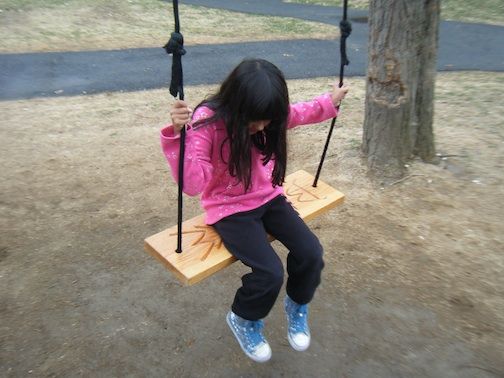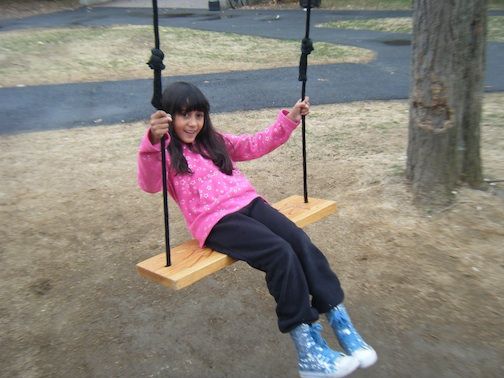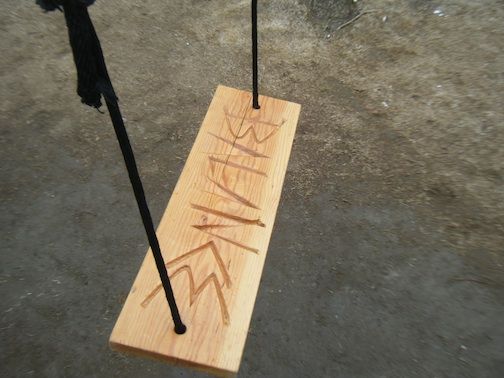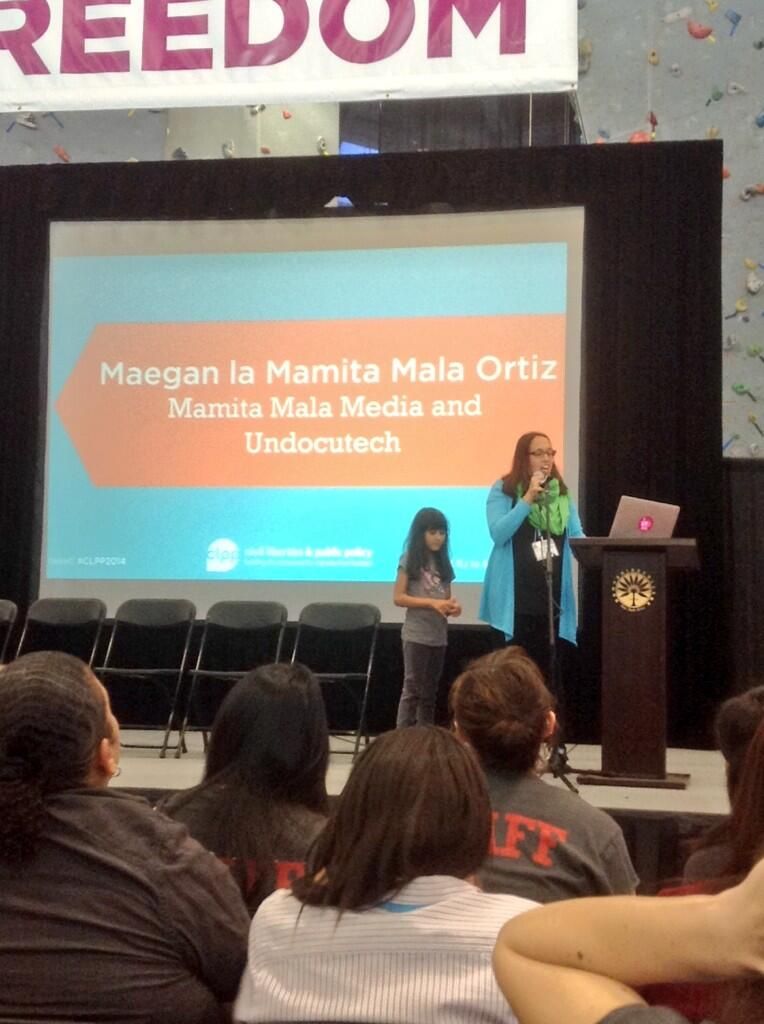The weekend of April 11-13 was a big weekend. I went to a conference that I had never been before to co-facilitate a “Don’t Leave Your Friends Behind: Supporting Kids & Caregivers in Our Movements” workshop along with Marianne Bullock and Maegan la Mamita Mala Ortiz. It was the first time a conference had paid to fly me out and put me in a hotel, which is wonderful, I wouldn’t have been able to go without that; and also a bit stressful as you are preparing to leave into the unknown and wonder if you are worth it, if you have anything to say. But I reminded myself: Yes I am worth it! And I have something to say!
The Civil Liberties and Public Policy Conference took place at Hampshire College in Massachusetts and the theme was “From Abortion Rights to Social Justice: Building the Movement for Reproductive Freedom.” Everywhere I went the conversations were deep, intersectional, and comprehensive of the ideas of reproductive justice and the many ways that oppression impacts our bodies and our choices. Workshops and panels encompassed many different ways people are oppressed and how we can support and join with each other for everyone’s liberation.
When it came time for our workshop late on Saturday, I had already been fired up, hearing such context, meaning, and brilliant articulation on why we are here—from the stories of different black and queer organizers in the South (“Strategic Action Session: Cross-Movement Organizing in the South”) on immigration rights to organizing farmers, and against fracking (everything impacts reproductive freedom after all!) to a panel of three different Latina trans women speaking out on Transfeminism. Katherine Cross’s refrain: No Uterus Required, Just Patriarchy! was powerful and she shared the many ways we need to center and support our trans sisters in their reproductive justice; trans rights are reproductive rights.
That morning the opening plenary had moved me close to tear multiple times upon hearing moving stories from prison; from those who had been sterilized; and Mala's poem and shout out to mothers fighting sexism and racism online and in the streets, fighting for their lives and to not have their work erased and taken credit for by others, to remain visible, and to survive. I even was blessed to see one of the founders of the term “reproductive justice” in person, Loretta Ross. I was now feeling ready to get into the nitty-gritty of our workshop; to delve into practical discussion on ways to support families in our movements.
"Even if they had free abortions & a Cadillac to drive me to the clinic, I'd still be poor, oppressed, & sterile" - Loretta Ross #CLPP2014
The classroom was already arranged in a nice circle and it was pleasant with a window cracked open and sunshine streaming in. I started the workshop with liberation stretches that I had learned from Regeneración and shared how they often played many games that were good for community building. I flew an airplane that Lucy (age 13) had made me with my name written on it. Everyone was impressed how straight it flew. I placed the toys in the middle of the room for a visual telling of how others could do at their meeting, now it was easy for me to do this as I had assembled a group of toys I could take to any meetings. Then Marianne, Mamita La Mala, and I shared our experiences. I shared how sometimes nothing changes, or one person makes change, and if they leave or are not there, nothing changes. Mala shared how she pushed for childcare and how important it is to have childcare in the early planning, not as an after thought or oversight. Marianne shared how she had struggled just a few days ago with lack of childcare as she prepared with her amazing work in The Prison Birth Project (a group she co-founded and was recently part of passing anti-shackling legislature).
I shared with the room the lack of progress that I witnessed over time, childcare failures in large conferences like the Social Forum in Detroit a few years back; new groups of parents, each year, being struck with shock by the difficulties of their transition into parenthood the same way that parents had been for decades before them. The repetition of social justice organizational childcare failures, insufficient preparation, and trying to fix things after they failed. The repetition of lack of support and respect for hands on mothering. Why can’t we make more progress in this? And also the way that I have witnessed good childcare, breakthrough moments, and inspirational programming through the work of one person, or just a few people, that things get better. And then when they leave, everything is back to as bad as it was before, and without childcare, support, or programming for children.
Mamita La Mala shared how she pushed to make change, and to take her daughter with her to be present in these spaces. That even this conference was not that child-friendly or good with childcare in the past and how she had pushed for it to be better. That she is usually that one, speaking up. Marianne spoke of the need for activities and spaces that both her and her daughter could enjoy together, as well as childcare difficulties, and that she felt struggling and in need of more answers with this question too. That does it only have to be mothers, asking for childcare (or safe and positive experiences in childcare), after none is provided? Mamita Mala added that it needs to be everyone, not only parents, to plan and realize that childcare must come first and organize as a priority from the beginning, if you seek to not exclude parents and marginalized groups within your organizing.
@NicoleClarkLMSW live tweeted quotes from Mala from our workshop:
"If you want more moms in conference spaces, we should be able to take that space and be supported with our children"
"If social justice matters to you & you want to embody it for your kids, you want to have them in the room with you" - @mamitamala #CLPP2014
Later as we broke down into small groups, to discuss some of the individual questions that had come up. What personally struck me and lingered the longest was one question I had not understood – asking everyone to phrase their question or problem on an index card in 8 words or less. A woman who had worked as a nanny and now was a mother too, talked about how does she overcome undeserving feelings. That she should do all the work, that she can, and not complain, or need more. This is what others insist to her, her employers, society, and her ex. This struck me hard, as in my own way, I also struggle with undeserving feelings. I thought she needed to reach out to find others to talk with, for support.
In our discussion group, with also the assertions of a younger newer mom who knows how much time and energy it takes to care give and how hard then for this to be something more ON YOU, to reach out for, instead of support OFFERED by others, we got to the root of the issue, that when our needs are not provided for; we can feel undeserving that they should be. It takes, at times, intense and fiery radicals or radical energy to fight back. When the norm is to treat us as undeserving, it is hard to feel deserving. Not offering childcare support, not having access, not only not allows us to participate but also sends a message we do not deserve to participate.
"When the norm is to treat us as undeserving, it is hard to feel deserving. Not offering childcare support, not having access, not only not allows us to participate but also sends a message we do not deserve to participate."
Other groups discussed different issues. (We had broke down into four groups to discuss our personal questions written on an index card.) These were:
 |
| Poronto w/ sparkly shoes |
Problems/Questions:
-What roles can children have in the Social Justice/Reproductive Justice Movement?-Moving societal structure to include families in activism
-Fun time related to Reproductive Justice/Social Justice with my kid
-Supporting fellow board members who have small kids - creating more family-friendly culture in our organization
-How can adults without children be better allies to parenting activists?
-Fun stuff + responsible child care for toddlers
-More space for kids in workshops/less isolation
-Making free, public daycare for all a real option
-Ideas about supporting parents with kids who have specific/special care needs (i.e. special training/knowledge to care for kid)
-How can I best support caregiving and children?
-Mommy friends in other states need childcare help.
-Comfortableness, cost, positive growth skills
-I want visibility and support for trans* families
-Supporting queer & trans m/others/parents
-Going from childcare provider to parent and overcoming undeserving feeling.
-It’s hard to tell people how to help!
After the small groups came up with tips they shared them with the room. This is the list, as a group, we came up with for tips for everyone to support families in social justice movements. (I’ve left them grouped in their small groups.) :
 |
| really cool swing outside |
TIPS
* Model Inclusiveness - Welcome all! Don’t just say it: show it.*Anticipate childcare needs - Every Time. Every event needs to plan for childcare; and to consider children and parents participation needs. Plan for childcare from the start.
*Consider Children and caregivers - notice who is in the room. Bring up the need for childcare before it becomes a problem that is brought up by those who are excluded.
*Showing up. Think about parents and children and make an effort. Ask caregivers and children what you can do to support them. Build intergenerational community.
* Supporting all parents, not just parents in Reproductive Justice movement
*Maintaining a living wage for childcare workers
*Time-gift exchange. Pay what you can - time pool. Trade childcare for other things.
*Child-care fund $ (similar to abortion fund)
* Offer group training on how to care for a specific child with a special need within your community
* Respect autonomy of kids
*Don't assume they won't get the issues
*Ask! Checking in with children and parents about pronouns, etc.
* Support parents to cut/check stereotypes’ perpetuated in school/daycare etc.
*Support to have conversations around gender
* Play Dates
* Free Childcare
* Zine making
* Art Projects
* Dinner Club - getting to know people better and becoming closer, gaining more support and building community that wouldn't have happened without that time together.
* Intentional Workshops - programming for children in the themes of the larger gathering, with some youth led activities, not created by parents. Kids love this and parents appreciate their children learning a message that’s not just coming from them.
*Adults go in and observe the kids spaces
*Acknowledging that children's noises are ok and part of growing our movement
* Bringing toys to an event
* Engaging and making eye contact with children
* Indy Kids - a resource
 |
| Balance. I would have never seen this swing w/out Poronto |
We saw familiar faces in each other, and from folks from previous workshops. We cannot let go of each other, or of this work, and our work continues over the course of our life and lives. We need to build together to support everyone’s rights and to continue our survival and intergenerational connection. Supporting parents and children is part of showing each other how to do that.
Each of us needs to be supported. As media makers, journalists, students, mothers, writers, activists, midwifes, doulas, and change makers. As human beings with full and varied lives, with what brings us joy, what makes us laugh, and where we can replenish ourselves and rest. What wonderful things we all can do, for ourselves, for each other, when we come together like this.
When we respect all people, including caregivers and children, for the work they do, what they bring, and what they need, we change the world, we grow larger than isolated short blips but over time, our strength is build over time, with the flow of time, to become part of larger movements, where like the swell of a wave, our collective strength; and collective liberation; is to be found.
THANK YOU to the Civil Liberty and Public Policy conference for their organizing work to provide an assessable and supportive conference with good childcare, which I felt I could witness shortly by the abundance of childcare providers, smiles, and the way that Poronto did not want to leave childcare at first when we went to pick her up.
P.S. this is the long version! If you want to share the short version of tips from our workshop click here

The primary aim of BRG is to provide efficient and expeditious services and give the best solutions for our clients’ products that include pharmaceutical consulting, medical devices, healthcare information technology, and scientific services.
ReplyDeletehttps://www.bellazon.com/main/profile/162239-biotech-research-group/?tab=field_core_pfield_12
http://queenofdating.net/user/BiotechResearchGroup
https://www.last.fm/user/BRGroup
https://muckrack.com/biotech-research-group
https://medium.com/@BiotechResearchGroup
https://aaryansmith.hatenablog.com/entry/2020/07/20/202956
https://biotechresearchgroup.com/
https://biotechresearchgroup.com/core-services/biologics/
https://biotechresearchgroup.com/core-services/medical-devices/
https://medium.com/@BiotechResearchGroup/why-need-of-scientific-and-regulatory-consultants-8ccf25e0fa78